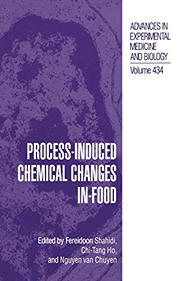Process Induced Chemical Changes in Food
Material type: TextLanguage: English Series: Advances in Experimental Medicine and Biology , vol. 34Publication details: New York : Springer Science Business Media ©1998Edition: 1stDescription: IX, 361 p. : illISBN:
TextLanguage: English Series: Advances in Experimental Medicine and Biology , vol. 34Publication details: New York : Springer Science Business Media ©1998Edition: 1stDescription: IX, 361 p. : illISBN: - 9781489919274
- 664 PRO
| Item type | Current library | Shelving location | Call number | Copy number | Status | Date due | Barcode |
|---|---|---|---|---|---|---|---|
 Reference Collection
Reference Collection
|
Seminar Library | Department of Food Engineering | 664 PRO | 2022-23 | Available | 98092 |
EDITORS
Memorial University of Newfoundland, St. John, Canada
Fereidoon Shahidi
Rutgers University, New Brunswick, USA
Chi-Tang Ho
Japan Women’s University, Tokyo, Japan
Nguyen Chuyen
SUMMARY:
Chemical changes that occur in foods during processing and storage are manifold and might be both desirable and undesirable in nature. While many of the processes are carried out intentionally, there are also certain unwanted changes that naturally occur in food and might have to be controlled. Therefore, efforts are made to devise processing technologies in which desirable attributes of foods are retained and their deleterious ef fects are minimized. While proteins, lipids and carbohydrates are the main nutrients of food that are affected by processing, it is their interaction with one another, as well as in volvement oflow-molecular-weight constituents that affects their flavor, color and overall acceptability. Thus, generation of aroma via thermal processing and bioconversion is of utmost importance in food preparation. Furthermore, processing operations must be opti mized in order to eliminate or reduce the content of antinutrients that are present in foods and retain their bioactive components. Therefore, while novel processing technologies such as freezing, irradiation, microwaving, high pressure treatment and fermentation might be employed, control process conditions in a manner that both the desirable sensory attributes and wholesomeness of foods are safeguarded is essential. Obviously, method ologies should also be established to quantitate the changes that occur in foods as a result of processing. This volume was developed from contributions provided by a group of internation ally-recognized lead scientists.
